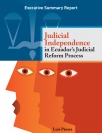In this executive summary of the report titled, Judicial Independence in Ecuador’s Judicial Reform Process, we examine what has happened to judicial independence as part of the “citizen’s revolution” led by President Rafael Correa.
Ecuador is a country in which the rule of law has not been solidly developed. Because it has been politically unstable throughout its history, those in power have made the justice system part of the political arena. Accordingly, criticism of the justice system and proposals for its reform have multiplied in recent decades.
This report does not attempt to cover all the actions taken in the course of the judicial reform begun in Ecuador. Rather, it has limited itself to raising questions about the steps taken during the course of this process with respect to judicial independence. Fieldwork was conducted in Ecuador in September 2013 in the form of interviews and the gathering of published and unpublished materials.
The report uses three main sources: court judgments handed down in several high-profle cases; resolutions of the Judicial Council in disciplinary proceedings against judges; and ofcial statements. The material examined mainly covers the period from July 2011 to December 2013.
The report examines 12 cases of social or political relevance, which elicited major media attention because they involved the government’s intent to penalize social protests or acts of political dissidence, thereby violating fundamental rights.
Read the full report here.






